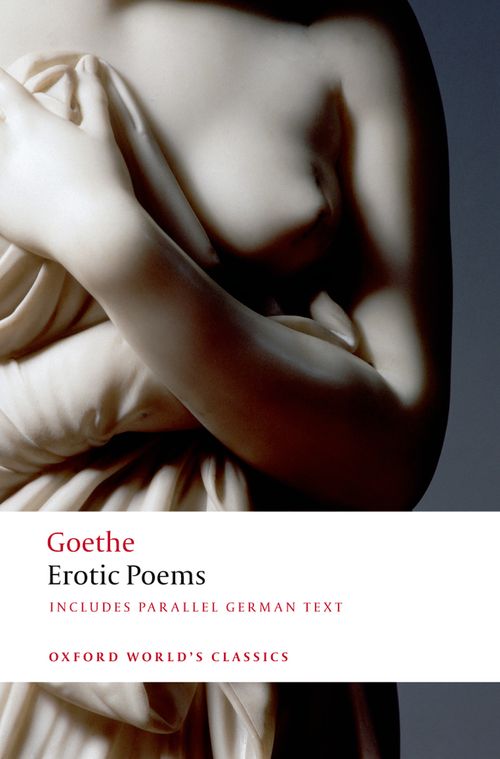Home >
Oxford World's Classics >
Erotic Poems (European Literature)
Oxford World's Classics: European Literature | European Literature
Erotic Poems
ISBN: 9780199549726
Series: Oxford World's Classics: ヨーロッパ文学
Erotic Poems (European Literature)
Oxford World's Classics: ヨーロッパ文学 Erotic Poems (European Literature) メディア > 書籍 > ノンフィクション > 言語学習書 Expect Delays of Up to 4 Weeks| ご注文はこちら |
ISBN
9780199549726 (旧規格ISBN: 0199549729)
- 説明
- シリーズの説明
作家名:ゲーテ
放題:(ゲーテ恋愛詩集)
'a world without love would be no world' Elegy II This bilingual edition of Goethe's erotic poems contains the Roman Elegies (1789), The Diary (1810), and a selection from the Venetian Epigrams of 1790. Editorial censorship has long obscured the true form and content of the Elegies, which were inspired by Goethe's sexual liberation in Italy and his love for the woman he took as his unofficial wife on his return to Germany.They are here presented as Goethe boldly conceived them together with the long-surpressed narrative poem known as The Diary. Superficially the story of a failed sexual adventure by a man of 60, at another level this is a profound study of the psychology of desire and the nature of fidelity, as well as being one of the most beautiful and good-humoured poems in the German language. Completing the edition is a selection from Goethe's more light-hearted and much censored cycle of erotica, the Venetian Epigrams. David Luke's translations do full justice to Goethe's aim of liberating German poetry and restoring sexual love to its central position in human life. Hans Vaget's fine introduction provides the background to these poems, as well as showing some of the profound and little-known connections between them. Johann Wolfgang Goethe was born in 1749, the son of a well-to-do citizen of Frankfurt. In the early 1770's he was the dominating figure of the German literary revival, his tragic novel Werther bringing him international fame. In 1755 he became a minister of state and director of the court theatre and in the 1790's he and his younger contemporary Schiller were the joint architects of Weimar Classicism, the central phase of German literary culture. Faust, written at various stages of his life and in a variety of styles, became a constantly enlarged repository of his personal wisdom and his creative energies never ceased to take new forms. In 1806 he married Christiane Vulpious, having lived with her for eighteen years. He died in 1832.
放題:(ゲーテ恋愛詩集)
'a world without love would be no world' Elegy II This bilingual edition of Goethe's erotic poems contains the Roman Elegies (1789), The Diary (1810), and a selection from the Venetian Epigrams of 1790. Editorial censorship has long obscured the true form and content of the Elegies, which were inspired by Goethe's sexual liberation in Italy and his love for the woman he took as his unofficial wife on his return to Germany.They are here presented as Goethe boldly conceived them together with the long-surpressed narrative poem known as The Diary. Superficially the story of a failed sexual adventure by a man of 60, at another level this is a profound study of the psychology of desire and the nature of fidelity, as well as being one of the most beautiful and good-humoured poems in the German language. Completing the edition is a selection from Goethe's more light-hearted and much censored cycle of erotica, the Venetian Epigrams. David Luke's translations do full justice to Goethe's aim of liberating German poetry and restoring sexual love to its central position in human life. Hans Vaget's fine introduction provides the background to these poems, as well as showing some of the profound and little-known connections between them. Johann Wolfgang Goethe was born in 1749, the son of a well-to-do citizen of Frankfurt. In the early 1770's he was the dominating figure of the German literary revival, his tragic novel Werther bringing him international fame. In 1755 he became a minister of state and director of the court theatre and in the 1790's he and his younger contemporary Schiller were the joint architects of Weimar Classicism, the central phase of German literary culture. Faust, written at various stages of his life and in a variety of styles, became a constantly enlarged repository of his personal wisdom and his creative energies never ceased to take new forms. In 1806 he married Christiane Vulpious, having lived with her for eighteen years. He died in 1832.
Oxford World’s Classics は、誰もが知る有名な物語から一般読者にはなじみの薄い隠れた名作まで、古典や文芸作品の数々を100年以上に渡り提供し続けているオックスフォード大学出版局を代表する叢書です。 現在メソポタミア神話から20世紀小説の名著まで、約770タイトルを刊行しており、各作品に相応しい専門家を校訂者に迎え、原典に解題、注釈、年代記、関係書目を付して紹介しています。必要に応じ、地図や用語集、索引、図版等の付録をつけているほか、読者に最新の研究動向を踏まえた作品理解を促すべく、定期的な新刊の追加や、既刊タイトルの改版を行っています。
(注意:本書は、原文を掲載した書籍です。グレイデッド・リーダーではありません)
作家名:ゲーテ
放題:(ゲーテ恋愛詩集)
'a world without love would be no world' Elegy II This bilingual edition of Goethe's erotic poems contains the Roman Elegies (1789), The Diary (1810), and a selection from the Venetian Epigrams of 1790. Editorial censorship has long obscured the true form and content of the Elegies, which were inspired by Goethe's sexual liberation in Italy and his love for the woman he took as his unofficial wife on his return to Germany.They are here presented as Goethe boldly conceived them together with the long-surpressed narrative poem known as The Diary. Superficially the story of a failed sexual adventure by a man of 60, at another level this is a profound study of the psychology of desire and the nature of fidelity, as well as being one of the most beautiful and good-humoured poems in the German language. Completing the edition is a selection from Goethe's more light-hearted and much censored cycle of erotica, the Venetian Epigrams. David Luke's translations do full justice to Goethe's aim of liberating German poetry and restoring sexual love to its central position in human life. Hans Vaget's fine introduction provides the background to these poems, as well as showing some of the profound and little-known connections between them. Johann Wolfgang Goethe was born in 1749, the son of a well-to-do citizen of Frankfurt. In the early 1770's he was the dominating figure of the German literary revival, his tragic novel Werther bringing him international fame. In 1755 he became a minister of state and director of the court theatre and in the 1790's he and his younger contemporary Schiller were the joint architects of Weimar Classicism, the central phase of German literary culture. Faust, written at various stages of his life and in a variety of styles, became a constantly enlarged repository of his personal wisdom and his creative energies never ceased to take new forms. In 1806 he married Christiane Vulpious, having lived with her for eighteen years. He died in 1832.
放題:(ゲーテ恋愛詩集)
'a world without love would be no world' Elegy II This bilingual edition of Goethe's erotic poems contains the Roman Elegies (1789), The Diary (1810), and a selection from the Venetian Epigrams of 1790. Editorial censorship has long obscured the true form and content of the Elegies, which were inspired by Goethe's sexual liberation in Italy and his love for the woman he took as his unofficial wife on his return to Germany.They are here presented as Goethe boldly conceived them together with the long-surpressed narrative poem known as The Diary. Superficially the story of a failed sexual adventure by a man of 60, at another level this is a profound study of the psychology of desire and the nature of fidelity, as well as being one of the most beautiful and good-humoured poems in the German language. Completing the edition is a selection from Goethe's more light-hearted and much censored cycle of erotica, the Venetian Epigrams. David Luke's translations do full justice to Goethe's aim of liberating German poetry and restoring sexual love to its central position in human life. Hans Vaget's fine introduction provides the background to these poems, as well as showing some of the profound and little-known connections between them. Johann Wolfgang Goethe was born in 1749, the son of a well-to-do citizen of Frankfurt. In the early 1770's he was the dominating figure of the German literary revival, his tragic novel Werther bringing him international fame. In 1755 he became a minister of state and director of the court theatre and in the 1790's he and his younger contemporary Schiller were the joint architects of Weimar Classicism, the central phase of German literary culture. Faust, written at various stages of his life and in a variety of styles, became a constantly enlarged repository of his personal wisdom and his creative energies never ceased to take new forms. In 1806 he married Christiane Vulpious, having lived with her for eighteen years. He died in 1832.
シリーズの説明
Oxford World’s Classics は、誰もが知る有名な物語から一般読者にはなじみの薄い隠れた名作まで、古典や文芸作品の数々を100年以上に渡り提供し続けているオックスフォード大学出版局を代表する叢書です。 現在メソポタミア神話から20世紀小説の名著まで、約770タイトルを刊行しており、各作品に相応しい専門家を校訂者に迎え、原典に解題、注釈、年代記、関係書目を付して紹介しています。必要に応じ、地図や用語集、索引、図版等の付録をつけているほか、読者に最新の研究動向を踏まえた作品理解を促すべく、定期的な新刊の追加や、既刊タイトルの改版を行っています。
(注意:本書は、原文を掲載した書籍です。グレイデッド・リーダーではありません)
EASY ORDER FORM
表示価格が税込価格
価格(税抜):
2,610 円


